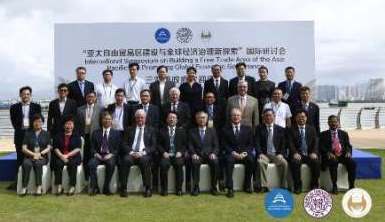 Sponsored by China National Committee for Pacific Economic Cooperation (CNCPEC), the APEC Study Center of Nankai University, Hainan CGE Peace Development Foundation and supported by the Center for China and Globalization, an international symposium, 'Building A Free Trade Area of Asia-Pacific and Promoting Global Economic Governance' was held in Sanya, Hainan, China on 15th August 2017.
Sponsored by China National Committee for Pacific Economic Cooperation (CNCPEC), the APEC Study Center of Nankai University, Hainan CGE Peace Development Foundation and supported by the Center for China and Globalization, an international symposium, 'Building A Free Trade Area of Asia-Pacific and Promoting Global Economic Governance' was held in Sanya, Hainan, China on 15th August 2017.
Mr. Gonzalo Gutierrez, Peruvian former foreign minister and current Ambassador to the European Union; Mr. Rory McLeod, Chair of APEC Economic Committee; Ambassador Tang Guoqiang, Co-chair of the Pacific Economic Cooperation Council (PECC), and Mr. Dai Yuming, Vice Mayor of Sanya City, delivered the welcome and keynote speeches.
More than 40 leading experts on APEC issues from top Chinese and foreign think tanks gathered at the Symposium to discuss and search means to turn the APEC economic leaders' vision and initiative of building a Free Trade Area of the Asia-Pacific (FTAAP) into viable action plans. The Symposium examined the potential well-being that FTAAP can create for the Asia-Pacific region, the challenges in building it, and the trade-off of interests between various stakeholders. The participants also held extensive discussions on strengthening the momentum of Asia-Pacific economic integration, exploring new concept and new model that the Asia-Pacific can contribute to the global economic governance.
The participants agreed that the Asia-Pacific is facing an increasingly complex economic situation, with the growth of the emerging economies slowing down and major developed economies struggling with structural problems internally. And thus the regional economic integration and cooperation is destined to be a long, zigzag process. "Based on the discussions, we have to find a balanced, inclusive and win-win method to meet the challenges and promote FTAAP in a steady way," said Amb. Tang Guoqiang.
The experts also agreed that realizing the Bogor Goals by 2020 -- complete trade and investment liberalization in the Asia-Pacific --- remains the core task of APEC. As a milestone of the APEC history, the Bogor Goals, established in 1994 at an APEC summit in Bogor, Indonesia, have contributed to the sustainable development and equitable growth of the member economies. They said that now that APEC has tasked itself with formulating a post 2020 new vision, the momentum of Bogor Goals should be carried on and its objectives further enhanced, and as such the various efforts to promote the realization of FTAAP should serve as the core driving force of Asia-Pacific economic integration in the Post-2020 era.
As Amb. Gonzalo Gutierrez and many other experts argued at the Symposium, if in the next three years there is no boost in the real trade negotiating process in the Asia-Pacific, we will reach a plateau in the intra and extra-regional exchange of goods and services, which will further impair the prospects to generate employment and development. Therefore our region needs the political will to start the negotiation of FTAAP as soon as possible, preferably as the RCEP process concludes or around 2020, as the Bogor Goals expire. For that purpose, we must reach a consensus on what to negotiate, how to do it, and when to start the process.